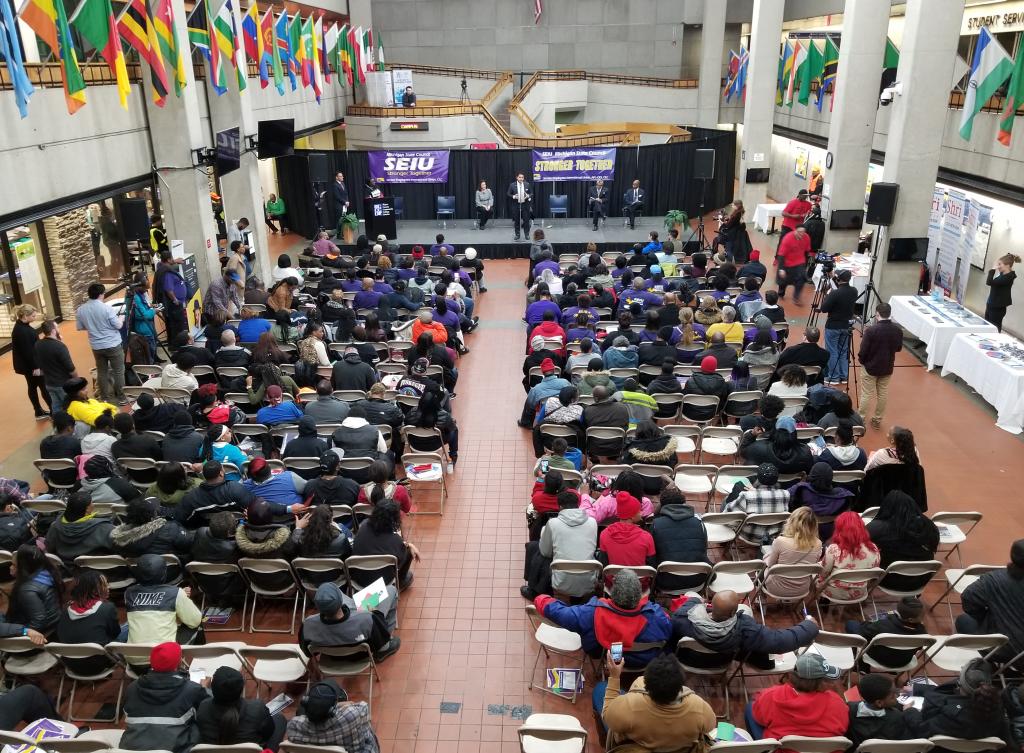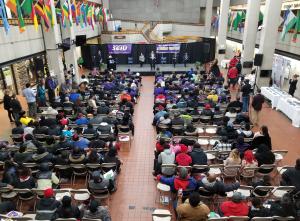
Unpacking MCO’s member-driven political endorsement process
By Jeremy Tripp
MCO Governmental and Political Affairs Director
Last night, the SEIU Michigan State Council held a gubernatorial forum at Wayne Community College in Detroit and invited every major candidate currently seeking the state’s top job.
For two hours, candidates and nearly 300 SEIU members from across the state discussed worker issues and candidates were given the opportunity to share their vision for Michigan. Those who accepted the invitation and were in attendance included democrats Bill Cobb, Abdul El-Sayed, Shri Thanedar and Gretchen Whitmer.
This forum is one piece of the SEIU Michigan State Council endorsement process which also includes questionnaires on specific member issues and concerns, candidate walk-a-days with members and meet and greets with executive boards of the various SEIU locals. To learn more about the endorsement process, please see below for an article published previously in the MCO Report explaining the ins and outs of election season.
MCO’s endorsement process
Every election cycle, dozens of candidates from both major parties ask MCO for an endorsement. But endorsements aren’t just handed out. MCO has a rigorous application and screening process that involves asking policy questions that have a direct effect on the membership. We don’t take it lightly.
To streamline the process, we utilize the Michigan State Council, which is set up to lend support to MCO and other SEIU locals in Michigan. It also helps candidates maximize their exposure, as a request to one SEIU local is as good as a request to all.
Through the Michigan State Council structure, all Michigan locals (MCO, SEIU-Local 517M, SEIU-Local 1 and SEIU Healthcare Michigan) collaborate on advancing a political and public policy agenda that affirms the dignity and worth of workers, improves the lives of all members and creates a more just society for all to succeed.
Through the joint endorsement process, we put these ideals into practice asking questions that reflect major issues specific to each local’s membership.
In the event that a candidate fails to garner unanimous support at the State Council, no endorsement will be given which allows individual locals the opportunity to endorse or not endorse as they see fit. If MCO still feels strongly about endorsement, we will review the candidate information and put them through a combination of the following steps:
Step 1: Engage in an initial discussion with MCO’s Political Department.
Step 2: Fill out a questionnaire with specifics on their campaign and issues relevant to MCO.
Step 3: Participate in a member driven screening process.
The exhaustive questionnaire is three pages long and demands thoughtful answers. Questions include:
• How much do you expect your campaign to cost?
• How much money have you raised?
• How do you plan to fund the rest of your budget?
• Do you support private prisons and/ or outsourcing services within the corrections system? This would include any and all proposals that would degrade the safety and security of correctional officers.
• What role do you think corrections plays in the criminal justice system and how do you think that should be represented in criminal justice reform?
• If elected, what are the top three (3) items you expect to accomplish at the completion of your first term?
If the candidate provides satisfactory answers, they may be asked to participate in a member-led screening. If the candidate is seeking office in a district with a large number of MCO members, Jeremy Tripp, Director of Government and Political Affairs, may work with the Executive Board and chapter leaders to assemble the member interview team. This allows members themselves to hear directly from the candidates and have a voice in union endorsements.
Other info on the union endorsement process:
• MCO does not endorse in every race. Endorsements are considered by weighing a variety of factors. These include but are not limited to membership density, district base, voting record, campaign viability, request for endorsement, and completion of MCO questionnaire and screening process.
• Typically, MCO does not get involved in county, township and municipal races unless a special request is made by the local MCO Chapter.
• MCO usually does not endorse a candidate for U.S. President.
